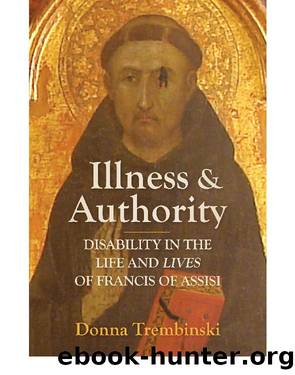Illness and Authority by Donna Trembinski;

Author:Donna Trembinski;
Language: eng
Format: epub
Tags: ADD SUBJECT
Publisher: University of Toronto Press
Disappearing Humanity, New Sanctity
It has long been understood that saints seem to become less differentiated and more stereotypically holy the further removed their hagiographies are from their subjects. Indeed, the revisions of saintâs lives often have more to do with responding to current political and social realities than with returning to explore the realities of a saintâs experience. By the thirteenth century, the methods for canonization were being formalized and had become quite rigorous. These formal processes included a papal investigation into the actions and miracles of a would-be saint. Many witnesses were called to attest to the holiness of the individual. Three uncontested miracles were required for consideration. The holy behaviour expected of saints was becoming limited by the thirteenth century as well. Increasingly, there were expected patterns of holy behaviour saints needed to exhibit. Erratic behaviour that did not conform to expectations was minimized in hagiographical texts.79
Unsurprisingly, Francisâ lives follow this general trend, although the trend is complicated by the more casual and personal reminiscences found in the Assisi Compilation. Later, however, Francis seems to shed his personality, and even his humanity, in the narratives of his life that continued to be written throughout the thirteenth century. The saint also becomes emotionally and physically stronger, and less in need of medical care and physical, and even emotional, comfort. One of the most obvious ways this is demonstrated in the early lives of Francis is in how Francis interacts with music.
It is clear from many of the earliest discussions of Francisâ life that the saint loved music.80 Of course he composed the Canticle of Brother Sun, which is his best known work, though he composed other pieces as well. Even hearing music inspired Francis and raised his spirits. Unsurprisingly, most of the evidence for Francisâ enjoyment of music comes from the Assisi Compilation.81 Those reminiscences, when they are included at all in the later lives, especially Bonaventureâs Legenda maior, are changed in ways that diminish Francisâ enjoyment of an earthly pleasure.
If one of the narratives in the Assisi Compilation can be trusted, Francisâ love of music was considered problematic by leaders of his order even in his own lifetime. AC 99 tells of how, near the end of his life, Francis used to comfort himself by singing the Praises of the Lord, a song of his own composition. Brother Elias, though, appears to have suggested that some people might find it unseemly for Francis to find joy in music so near the end of his life. The text records Eliasâ words to Francis:
Most dear brother, I am greatly consoled and edified from every joy which you show for yourself and your companions in such affliction and infirmity. However, granted that the people of this city venerate you for a saint in life and in death, nevertheless since they firmly believe that you are near death on account of your great and incurable infirmity, hearing Laudes of this sort being sung, they can think or say among themselves: âHow can he who is near death show such joy at this time? For he ought to be thinking about his death.
Download
This site does not store any files on its server. We only index and link to content provided by other sites. Please contact the content providers to delete copyright contents if any and email us, we'll remove relevant links or contents immediately.
| Belgium | France |
| Germany | Great Britain |
| Greenland | Italy |
| Netherlands | Romania |
| Scandinavia |
Room 212 by Kate Stewart(4750)
The Crown by Robert Lacey(4582)
Endurance: Shackleton's Incredible Voyage by Alfred Lansing(4523)
The Iron Duke by The Iron Duke(4130)
The Rape of Nanking by Iris Chang(4029)
Killing England by Bill O'Reilly(3901)
Joan of Arc by Mary Gordon(3802)
Say Nothing by Patrick Radden Keefe(3735)
I'll Give You the Sun by Jandy Nelson(3276)
Shadow of Night by Deborah Harkness(3187)
Hitler's Monsters by Eric Kurlander(3176)
Mary, Queen of Scots, and the Murder of Lord Darnley by Alison Weir(3081)
Blood and Sand by Alex Von Tunzelmann(3067)
Darkest Hour by Anthony McCarten(3019)
Margaret Thatcher: The Autobiography by Thatcher Margaret(2973)
Eleanor & Park by Rainbow Rowell(2950)
Red Famine: Stalin's War on Ukraine by Anne Applebaum(2818)
Book of Life by Deborah Harkness(2732)
The One Memory of Flora Banks by Emily Barr(2693)
